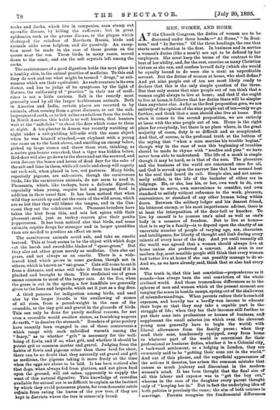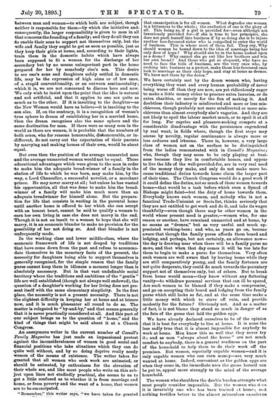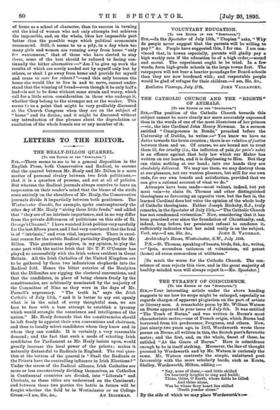MEN, WOMEN, AND HOME.
AT the Church Congress, the duties of women are to be- discussed under three heads,—" At Home," "In Busi- ness," and "In Service." Of the three headings, the one that starts most reflection is the first. In business and in service- s woman's duties (like a man's) are apt to be defined by her- employers. She must keep the terms of the contract to the best of her ability, and, for the rest, exercise as many Christian virtues as she can, and confess herself daily (which she would be equally bound to do were she a man) an unprofitable servant. But the duties of woman at home, who shall define?' And yet nine people out of ten are most likely ready to- declare that this is the only simple question of the three. But that only means that nine people out of ten think that a woman ought always to live at home; and that if she ought to live at home, it follows that her duties there will be simpler than anywhere else. As far as the first proposition goes, we are entirely of the opinion of the nine people out of ten—only we go fnrther, and think that a man should also live at home. But when it comes to the second proposition, we are entirely at issue with the nine people out of ten. Home is the right place for everybody, but there is no place where, in the great majority of cases, duty is so difficult and so complicated. And that, of course, is the profound truth at the bottom of the saying that "when a man marries his trouble begins," though why in the case of man this beginning of troubles. should be made to rhyme with "needles and pins" we have- never been able to understand. The life of a monk is simple though it may be hard, so is that of the nun. The pleasures- and the business of the world are renounced once for all, and God is served upon the narrow line that has seemed best to the soul that heard its call. Simple also, and not neces- sarily selfish, is the life of the bachelor of either sex in lodgings. He, or she, has his, or her, own work to do, own, pleasures to serve, own convenience to consider, and own- standard to satisfy without reference to the work, pleasure„ convenience, or standard of any other human being within- doors. Between the solitary lodger and his dearest friend,. his bitterest enemy, or his most importunate adviser, there 'is at least the interposition of the door-bell or knocker. To, live by oneself is to possess one's mind as well as one's body in a measure of freedom. But to live at home—.- that is to say in a family—is to depend upon the charity of an- uncertain number of people of varying age, sex, character, and intelligence, for liberty of thought and limb during every minute of every hour of the day. And yet until recently alb the world was agreed that a woman should always live at home unless she preferred a convent. And even in our- modern day, most sensible people still think that every woman, had better live at home if she can possibly manage to do so- And we, as we have already.said, think that so also had every man.
The truth is, that this last conviction—preposterous as it sounds—has always been the real conviction of the whole- civilised world. And those tremendous differences as to the- spheres of men and women which at the present moment are- ranging the sexes in hostile camps, spring out of the shallowest of misunderstandings. When parents reduce their household expenses, and heavily tax a hardly-won income to educate. their boys so that they may take a capable part in the. struggle of life ; when they tax their incomes still further to- put their sons into professions or houses of business, an supplement the small salaries (on which even the cleverest young men generally have to begin the world) with. liberal allowances from the family purse ; when they send their sons, handsomely equipped, away from home- to whatever part of the world is convenient for their professional or business duties, whether it be a Colonial city,. a backwood settlement, or a lodging in London, they are- commonly said to be "getting their sons out in the world.' And oat of this phrase, and the superficial appearances of the actions it denotes, has arisen the common mistake that causes so much jealousy and discontent in the modern woman's mind. It has been thought that the final aim of all this labour and expen4e was to "get the boy out,' whereas in the ease of the daughter every parent thought. only of "keeping her in." But in fact the underlying idea of both policies is precisely the same; the aim of both courses ise marriage. Parents recognise the fundamental differences Letween man and woman—to which both are subject, though neither is responsible for them—by which the initiative and, -consequently, the larger responsibility is given to man in all that concerns the founding of a family; and they do all they can to enable their sons to support not themselves only, but the wife and family they ought to get as soon as possible, just as they keep their girls at home, and, according to their lights, -train them in the domestic habits which have always been supposed to fit a woman for the discharge of her secondary but by no means unimportant part in the home prepared for her by somebody else's son. This desire -to see one's sons and daughters safely settled in domestic life, may be the expression of high aims or of low ones, -of a stupid conventionality, or an outworn sentimentality ; which it is, we are not concerned to discuss here and now. We only wish to insist upon the point that the idea is natural -and not artificial, and that it applies to one sex quite as -much as to the other. If it is insulting to the daughter—as the New Woman would have us believe—it is insulting to the 'son also. If, on the contrary, it is a recognition of woman's -true sphere to dream of establishing her in a married home, Allen the dream recognises also the same sphere and the same destination for man. If there were as many men in the world as there are women, it is probable that the numbers of hoth sexes, who for reasons honourable, dishonourable, or in- ‘different, do not carry out the expectation of their parents by marrying and making homes of their own, would be about But even then the position of the average unmarried man and the average unmarried woman would not be equal. Those -educational advantages which were given to the man in order to make him the adequate bread-winner of a family in the -station of life to which he was born, may make him, by the way, a Lord Chancellor, a successful novelist, or a merchant -prince. He may never marry at all; but unless he has wasted -his opportunities, all that was done to make him the bread- -winner of a family will make him much more than an adequate breadwinner for himself alone. But the prepara- tion for life that consists in waiting in the parental home ontil another home is offered to her which she can accept with an honest heart, cannot be said to qualify a woman to -earn her own living in ease she does not marry in the end. -Though it is not an insult to a woman to hope that she will marry, it is an economic blunder to make no provision for the possibility of her not doing so. And that blunder is not -infrequently made.
In the working class and lower middle-class, where the -economic framework of life is not draped by traditions that have come down from the past and refuse to accommo- -date themselves to the monetary facts of the present, the necessity for daughters being able to support themselves is generally recognised, for the simple reason that the family .purse cannot keep them in idleness a moment longer than is absolutely necessary. But in that vast undefinable social territory where the traditions and ambitions of the " gentle " life are well established (though not always well endowed), the question of a daughter's working for her living does not pre- -sent itself with the same elementary simplicity. In the first place, the necessity is not a present necessity. There is not the slightest difficulty in keeping her at home and at leisure now, and it is much pleasanter all round to do so. The matter is relegated to "by-and-by," and that means generally that it is never practically considered at all. And this part of -our subject brings us to the question of "home," and the kind of things that might be said about it at a Church 'Congress.
An anonymous writer in the current number of Cassell's Family Magazine has just made an impassioned protest against the inconsiderateness of women in good social and financial positions who take situations which they can do -quite well without, and by so doing deprive really needy -women of the means of existence. The writer takes for granted that all women who seek work are animated, or should be animated, by enthusiasm for the elevation of their whole sex, and like most people who write on this sub- ject upon lines not studiedly practical, she seems to us to get a little confused as to whether it is from marriage and home, or from poverty and the want of a home, that women are to be emancipated.
"Remember," this writer says, "we have taken for granted
that emancipation is for all women. What degrades one woman is a bitterness to the whole; the exaltation of one is the glory of all. This being so, if a girl is provided for—even although not luxuriously provided for—if she is true to her principles, she dare not push herself into business if by so doing she is to injure another less-favoured sister who is compelled to enter the world of business. This is where most of them fail. They cry, Why should woman be bound down to the idea of marriage being her only door of hope ? Why should she be in the home looked upon as a drone P Why cannot she go out like her brothers and win her own bread ? And those who get so eloquent, who have no need to face the toils of business, are the very ones who, by rushing into business as a protest, make those less-favoured ones look to marriage as their only hope, and stay at home as drones. We have met them by the dozen."
We have certainly met by the dozen women who, having everything they want and every human probability of never being worse off than they are now, are yet ridiculously eager to make a little money either to procure extra luxuries, or do extra charities, or merely for the fun of making it. And doubtless their industry is misdirected and more or less mis- chievous, though probably not more miedirected or more mis- chievous than almost everybody else's vagaries. And they are not likely to spoil the labour market much, or to spoil it at all for long. For caprice and pleasure-seeking compete at a considerable disadvantage with the persistence engendered by real want, in fields where, though the first steps may amuse by novelty, regular continuance is always more or
less arduous and irksome. There is, however, a very large class of women not on the surface to be distinguished from the ladies remonstrated with in Cassell's Magazine ; who, though they may seem to be only playing at busi-
ness because they live in comfortable homes, and appear to live the life of the well-provided-for, are in very real need of the money they make, and only do not make more be- cause traditional duties towards home claim the larger part of their time. The Church Congress would do a good work if it could define the duties, not so much of these women towards home—that would be a task before which even a Synod of Bishops might faint—but the duty of home towards them. Everybody knows such women, and nobody who is not a fanatical Trade-Unionist or Socialist, thinks seriously that they are not entitled to get work and do it, and take its wages thankfully—even though there may be other women in the world whose present need is greater,—women who, for one reason or another, have remained unmarried and at home, by no means as "drones," but as very useful and much ap- preciated working-bees ; and who, as years go on, become aware that though the family purse affords them board and lodging, and perhaps, but not certainly, an allowance now— the day is drawing near when there will be a family purse no more, and that when that day comes it will be too late for them to begin to make a purse for themselves. Very often such women are well aware that by leaving home while they are still comparatively young, and the family fortunes are not quite desperate, they could do much towards the pecuniary support not of themselves only, but of others. But to break from home would mean—they know without any flattering
vanity—to withdraw personal services that can ill be spared. Are such women to be blamed if they make a compromise, and go on accepting their board and lodging from the family purse which still looks so fat, and at the same time make a little money with which to stave of ruin, and provide modestly for the future ? Obviously not. And as a matter of fact, it is not blame they stand so much in danger of as the fate of the goose that laid the golden eggs.
We have already declared ourselves to be of the opinion that it is best for everybody to live at home. It is none the less sadly true that it is almost impossible for anybody to work at home. Men know this so well that they never try it ; and as men "always about the house" are not much
comfort to anybody, there is a general readiness on the part of the household to help them to do their work off the premises. Bat women, especially capable women—and it is only capable women who can earn money—are very much wanted at home. Indeed, convenient as the golden eggs are when they come in, the immediate uses the goose herself can
be put to, appeal more strongly to the mind of the average household.
The woman who shoulders the double burden attempts what most people consider impossible. But the woman who d,,es it is invariably one who has been trained IA home ; &lid
nothing testifies better to the almost miraculous exueiletca of home as a school of character, than its success in turning out the kind of woman who not only attempts but achieves the impossible, and, on the whole, likes her impossible part better than the possible ways which political economists recommend. Still, it seems to us a pity, in a day when too many girls and women are running away from home "only for wantonness," that of those who have elected to stay there, some of the best should be reduced to facing con- tinually the bitter alternative :—" Am I to give up work the results of which are sorely needed not by myself only but by others, or shall I go away from home and provide for myself and cease to care for others ? "—and this only because the home she would like to live in and to serve, cannot under- stand that the winning of bread—even though it be only half a loaf—is not to be done without some strain and worry, which call for a little extra consideration in those who undergo it, whether they belong to the stronger sex or the weaker. This seems b us a point that might be very profitably discussed at the Church Congress when they are on the subject of " home " and its duties ; and it might be discussed without any introduction of fine phrases about the degradation or exaltation of the whole female sex or any member of it.




































 Previous page
Previous page